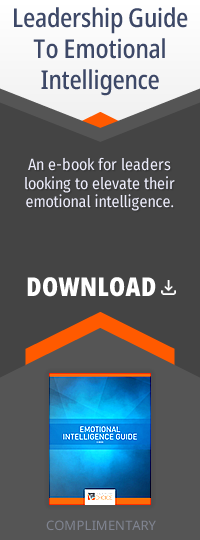A Deep Dive on Understanding Emotional Intelligence as a Leader

The Cornerstone of Leadership: Emotional Intelligence.
What is Emotional Intelligence?
Emotional intelligence (EI) is the ability to recognize, understand, and manage your own emotions while also influencing the emotions of others.
For leaders, this means handling workplace stress, inspiring teams, and navigating conflict without losing focus or composure. The five key components: self-awareness, self-regulation, motivation, empathy, and social skills – form the foundation of emotionally intelligent leadership.
Why does Emotional Intelligence matter?
Leaders with strong EI build trust, encourage collaboration, and foster environments where employees thrive. As organizations grow more complex, the ability to connect on an emotional level sets exceptional leaders apart.
Here’s how EI impacts organizational success, and learn actionable strategies to strengthen your EI for leading effectively.
The Core Components of Emotional Intelligence in Leadership

Emotional intelligence forms the foundation of effective leadership, guiding how you interact with your team and approach challenges. Understanding and applying its core components – self-awareness, self-regulation, motivation, empathy, and social skills – enables you to lead with clarity, foster trust, and drive meaningful results.
Self-Awareness: Recognizing and Understanding Your Emotions
Self-awareness involves recognizing your emotions as they arise and understanding their impact on your thoughts and behavior. For leaders, this means identifying triggers, biases, and patterns that influence decisions.
Example: During a high-stakes project, you may feel frustrated when team members miss deadlines. Recognizing this frustration allows you to address the underlying issue constructively rather than reacting impulsively. Leaders who practice self-awareness make better choices because they pause, reflect, and adjust their approach.
Self-Regulation: Managing and Controlling Emotional Reactions
Self-regulation is your ability to control impulsive emotions and behaviors, stay calm under pressure, and remain flexible when circumstances change. Leaders who master self-regulation create environments of stability and reliability.
Example: Imagine a meeting where unexpected criticism arises. Instead of snapping defensively, a self-regulated leader remains composed, acknowledges the feedback, and seeks solutions collaboratively. This composure not only resolves conflict but also models emotional control for others.
Motivation: Channeling Emotions Toward Goals
Motivation within emotional intelligence involves maintaining a positive outlook and using emotional energy to achieve objectives. Leaders who demonstrate motivation inspire teams to persevere and innovate, even in difficult times.
Example: A motivated leader facing organizational restructuring might openly share their vision for the future, energizing their team by emphasizing the growth opportunities. Their enthusiasm motivates others to stay engaged and committed despite challenges.
Empathy: Understanding and Addressing the Emotions of Others
Empathy allows you to sense and understand the emotions of others, fostering stronger connections and trust. For leaders, empathy means actively listening to team members and validating their experiences.
Example: A team member struggling with burnout approaches you for support. An empathetic leader listens without judgment, acknowledges their feelings, and works with them to find solutions, such as adjusting workload or offering resources. This builds loyalty and shows your team that their well-being matters.
Social Skills: Building Relationships and Fostering Collaboration
Social skills encompass effective communication, conflict resolution, and working well with diverse groups. Leaders with strong social skills excel at building connections and facilitating teamwork.
Example: During a disagreement between departments, a socially skilled leader facilitates open dialogue, ensuring all perspectives are heard. By encouraging collaboration and mediating effectively, they turn discord into actionable progress.
When you embrace these components of emotional intelligence, you develop the tools to lead with authenticity and effectiveness.
The Organizational Impact of Emotionally Intelligent Leadership

Leaders who demonstrate emotional intelligence create an environment where teams thrive, thoughtfully execute decisions, and employees feel valued. This ripple effect enhances not only individual performance but also the broader success of the organization.
Team Dynamics: Building Trust, Reducing Conflict, and Enhancing Cohesion
Emotionally intelligent leaders understand that trust is the foundation of effective teams. By being consistent, transparent, and empathetic, they create an atmosphere where team members feel secure and respected.
When trust exists, conflicts are less likely to escalate into unproductive disputes. EI allows leaders to identify tensions early and address them diplomatically. This proactive approach minimizes misunderstandings and keeps teams focused on their goals.
Consider a scenario where two team members disagree on the direction of a project. An emotionally intelligent leader actively listens to both sides, acknowledges their perspectives, and facilitates a compromise that satisfies shared objectives. This resolves the immediate conflict and reinforces a sense of teamwork and mutual respect.
Strong EI also fosters cohesion by valuing individual contributions and encouraging collaboration. Leaders who recognize the unique strengths of their team members promote inclusivity and inspire everyone to work toward common objectives.
Decision-Making: Strengthening Problem-Solving and Strategy
Effective decision-making requires more than just logic; it demands emotional insight. Leaders with self-awareness understand how their biases and emotions can impact their choices. They pause to reflect, ensuring decisions are made with clarity and fairness.
Empathy also plays a critical role in strategic decision-making. Understanding the perspectives and needs of employees, customers, or stakeholders enables leaders to craft equitable and impactful solutions.
Imagine a company facing the decision to implement cost-cutting measures. An emotionally intelligent leader evaluates the financial data and considers the impact on employee morale and productivity. By communicating transparently and involving teams in the process, the leader ensures the decision is pragmatic and compassionate.
This balanced approach reduces the likelihood of resistance and builds confidence in leadership decisions, even during challenging times.
Employee Engagement: Driving Satisfaction and Retention
Employee engagement flourishes in environments where leaders genuinely care about the well-being of their teams. Emotional intelligence equips leaders to recognize signs of disengagement or burnout and address them proactively.
Employees who feel heard are more likely to remain committed to their roles and the organization. Leaders who practice empathy and social awareness create a culture of support, enabling employees to bring their best selves to work.
For example, a leader notices a top performer becoming less enthusiastic. Instead of making assumptions, they schedule a one-on-one meeting to understand the root cause. By showing genuine concern and offering solutions (such as flexible scheduling or professional development opportunities), they reengage the employee and reinforce their sense of belonging.
Emotionally intelligent leaders also celebrate achievements and recognize contributions regularly, which boosts morale and loyalty. These actions directly contribute to higher retention rates and a better reputation as an employer.
Developing Emotional Intelligence as a Leader

Emotional intelligence is not a fixed trait; it’s a set of skills you can refine over time. Developing your EI as a leader requires intentional self-reflection, focused practice, and a commitment to growth. You can foster stronger connections and lead with greater impact by evaluating your current strengths, adopting practical strategies, and embedding EI into your daily leadership practices.
Self-Assessment and Reflection
Growth begins with understanding your starting point. Assessing your emotional intelligence provides insight into your current strengths and areas for improvement. Tools like 360-degree feedback surveys and EI-specific assessments, such as the Emotional Quotient Inventory (EQ-i 2.0), can offer valuable perspectives from colleagues and team members.
Reflection is equally important. Regularly ask yourself questions like:
- “How do my emotions affect my decisions?”
- “Do I respond or react to stressful situations?“
- “Am I aware of how my actions influence others?”
Journaling these reflections helps you track patterns over time and identify areas for growth. Self-awareness starts with taking an honest look at your behavior and its effects.
Building EI Skills
Enhancing Self-Awareness
To improve self-awareness, consider mindfulness practices such as meditation or breathing exercises. These tools help you recognize emotional triggers and stay present in stressful situations.
Example: Before a critical meeting, take five minutes to practice deep breathing. This simple act centers your thoughts, allowing you to approach the discussion with clarity and control.
Improving Empathy and Active Listening
Empathy can be strengthened by intentionally seeking to understand others’ perspectives. Practice active listening by:
- Giving the speaker your undivided attention.
- Asking open-ended questions to encourage deeper sharing.
- Paraphrasing their points to confirm understanding.
Example: During a performance review, an empathetic leader asks an employee about their goals and listens carefully without interrupting. This shows respect and fosters a more productive conversation.
Strengthening Social Skills Through Communication
Effective communication is a hallmark of emotionally intelligent leaders. You can refine this skill by:
- Practicing assertiveness to express your needs clearly and respectfully.
- Observing nonverbal cues to understand what’s unsaid in conversations.
- Offering constructive feedback that focuses on solutions, not blame.
Example: When providing feedback on a missed deadline, focus on the impact rather than the mistake. Say, “Meeting deadlines ensures the project stays on track. How can we work together to improve this moving forward?”
Integrating EI into Leadership Practices
Developing emotional intelligence isn’t just about occasional actions; it’s about weaving it into your leadership style. Daily habits and frameworks help reinforce these skills over time.
- Daily Habits: Start each day by intending to approach interactions with empathy. End the day with a brief reflection on emotional challenges and successes.
- Leadership Frameworks: Use collaborative models like Servant Leadership, which prioritize the needs of your team and encourage a supportive culture.
Example: During team meetings, devote time to acknowledge successes and discuss any emotional challenges. This practice builds trust and reinforces your role as an emotionally attuned leader.
Continuous Improvement
Emotional intelligence is a lifelong practice. Seek opportunities to learn from others by attending EI workshops, reading about emotional and social dynamics, or engaging with a leadership coach.
Mentorship can also be a powerful tool. A trusted mentor can offer candid feedback and share strategies for handling complex emotional scenarios.
Example: Regularly schedule coaching sessions to discuss leadership challenges and gain tailored advice for applying EI principles in your organization.
Committing to self-assessment, building key skills, and embedding emotional intelligence into your leadership practices creates a sustainable foundation for personal and professional growth.
Leading with Emotional Intelligence
Emotional intelligence is more than a leadership tool; it’s a transformative approach that enhances relationships and organizational culture. By understanding the core components of EI, you position yourself as a leader who inspires trust, fosters collaboration, and drives meaningful outcomes.
Now is the time to take action.
Start with self-assessment to identify your strengths and opportunities for growth.
Engage in training or explore strategies to build self-awareness, empathy, and communication skills. With consistent practice and a growth mindset, you can develop the emotional intelligence needed to navigate challenges and lead effectively.
Daniel Goleman, a pioneer in emotional intelligence research, said:
“What really matters for success, character, happiness, and life-long achievements is a definite set of emotional skills.”
By embracing emotional intelligence, you don’t just lead; you leave a lasting legacy that shapes the success of your team and organization.
About the Author:
Pat Bosworth
Founder and CEO Patrick effectively coaches leaders at all levels and across a number of industries with a pragmatic, consultative approach. Previously, he was vice president with Right Management and held other senior OD and development positions in manufacturing and the professional services Industries.
He holds an M.S. in Industrial/Organizational Psychology from Lamar University.



